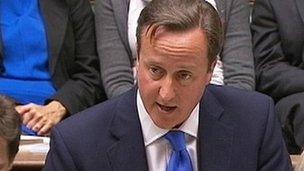David Cameron pressed over Rwanda aid money
- Published

David Cameron said he was proud to have funded improvements in Rwanda
David Cameron has been pressed to say why the government gave £16m in aid to Rwanda, while its rulers allegedly funded rebels "killing, maiming and raping" in neighbouring Congo.
Government Chief Whip Andrew Mitchell authorised the payment in his last day in his previous job of international development secretary in September.
Labour MP Kevin Brennan said he was "concerned" about reports from Congo.
The PM said he would hold "firm" talks with Rwandan President Paul Kagame.
His regime has been praised for improving the economic and social conditions in the east African country, in which it is estimated more than 800,000 people were killed in ethnic violence during 1994.
But Mr Kagame, in power since 2000, has come under fierce criticism recently for allegedly funding the M23 rebel group in the east of the Democratic Republic of Congo (DRC).
A leaked United Nations document says Rwanda's defence minister is effectively commanding the rebellion.
The violence has drawn international condemnation and the US and some European countries have withheld aid from the Kagame regime.
'Success story'
In July, Mr Mitchell blocked the UK's £27m annual contribution to the Rwandan government after he visited the Kivus region of the DRC.
However, he decided last month to unfreeze the aid, citing progress at international talks, meaning a £16m tranche of the £37m was paid.
Mr Mitchell's successor in the international development role, Justine Greening, will decide in December whether to free up the remaining £21m.
During Prime Minister's Questions in the House of Commons, Mr Brennan said: "We remain very concerned by the continuing reports of Rwandan support for the M23 rebels, who are killing, maiming and raping in east Congo.
"So why, then, did the government's chief whip authorise the payment of £16m of British taxpayers' money to Rwanda as his parting shot in his very last day as international development secretary?"
Mr Cameron replied: "I'm clear Rwanda has been, and continues to be, a success story of a country that has moved from genocide and disaster to become a role model for development and lifting people out of poverty in Africa.
"And I'm proud of the fact that the last government and this government have continued to invest in that success.
"But I'm equally clear that we should be very frank and very firm with President Kagame and the Rwandan regime that we do not accept that they should be supporting militias in Congo or elsewhere.
"I will raise this issue presently with the president, but I continue to believe that investing in Rwanda's success as one of those countries in Africa that's showing you can break the cycle of poverty, you can improve conditions for people, is something that we are right to do."
The rebellion started in April, when a militia that had been absorbed into the Congolese army mutinied and went on the rampage.
Since then nearly half a million people have been displaced by fighting between the M23 and the army.
Mr Cameron visited Rwanda in 2007 to learn about development issues. He was criticised for doing so at a time when parts of his constituency of Witney, in Oxfordshire, was experiencing flooding.
- Published17 October 2012
- Published19 September 2012